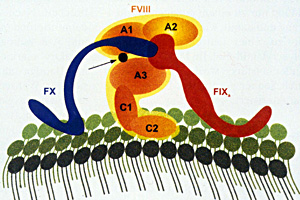Research : Factor VIII and thrombotic risk

Molecular basis of increased factor VIII levels in the pathogenesis of thromboembolic disease
Matthias Watzka (Frankfurt)Osman El-Maarri, Katrin Klempau (Bonn)
Arterial and venous thromboembolism are frequent disorders, with a combined incidence of 5 to 10 cases per 1000 individuals per year. Some genetic risk factors as factor V Leiden mutation and prothrombin 20210 gene mutation have been identified. More recently, increased factor VIII levels have been found to play an important role for the clinical manifestation of thrombosis. In the present study the molecular basis of increased factor VIII levels, especially those affecting the transcription of the factor VIII gene, will be investigated. To allow for using rat as an animal model the sequence and structure of the rat FVIII cDNA has been dissolved, revealing a quite divergent Factor VIII protein when compared to human factor VIII (Watzka et al. 2004). Finding the molecular basis of increased FVIII levels will be important for the pathogenesis of thrombosis as well as for the efficacy of future gene therapy protocols for haemophilia A.
